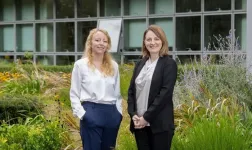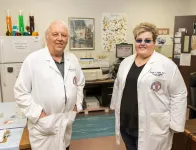(Press-News.org) The stats don’t lie – the overwhelming majority of start-up companies fail. So, what makes the seemingly lucky few not only survive, but thrive?
While good fortune and circumstances can play a part, new research reveals that when it comes to start-up success, a founder’s personality – or the combined personalities of the founding team - is paramount. The study, published today in Scientific Reports, shows founders of successful start-ups have personality traits that differ significantly from the rest of the population – and that these traits are more important for success than many other factors.
“We find that personality traits don’t simply matter for start-ups – they are critical to elevating the chances of success,” says Paul X. McCarthy, lead author of the study and adjunct professor at UNSW Sydney. “A small number of astute venture capitalists have suspected this for some time, but now we have the data to demonstrate this is the case.”
Personality key to start-up success
For the study, the team, which also included researchers from Oxford Internet Institute, the University of Oxford, University of Technology Sydney (UTS), and the University of Melbourne, inferred the personality profiles of the founders of more than 21,000 founder-led companies from language and activity in their publicly available Twitter accounts using a machine learning algorithm. The algorithm could distinguish successful start-up founders with 82.5 per cent accuracy.
They then correlated the personality profiles to data from the largest directory on start-ups in the world, Crunchbase, to determine whether certain founder personalities and their combinations in cofounded teams relate to start-up success – if the company had been acquired, if they acquired another company, or listed on a public stock exchange.
The researchers found that successful start-up founders’ core Big Five personality traits – the widely accepted model of human personality measuring openness to experience, conscientiousness, extraversion, agreeableness, and neuroticism – significantly differ from that of the population at large.
The facets distinguishing successful entrepreneurs include a preference for variety, novelty and starting new things (openness to adventure), like being the centre of attention (lower levels of modesty) and being exuberant (high activity levels).
“The greater presence of these and other personality traits in founders are related to higher chances of success,” says Dr Fabian Braesemann, co-author of the study from the Oxford Internet Institute, University of Oxford.
“We can see how this plays out in many notable examples,” Prof. McCarthy says. “The adventurousness and openness to experience of Melanie Perkins, the assertiveness and confidence of Steve Jobs, the exuberance and energy of Richard Branson, the calm under pressure Jeff Bezos, the discipline and focus of Mark Zuckerberg, and the trustworthiness of Larry Page and Sergey Brin underpin their company’s success.”
Dr. Marian-Andrei Rizoiu, a senior lecturer leading the Behavioural Data Science lab at UTS says: “We used machine learning and a variety of advanced statistical tests to reveal that there is not just one type of successful founder but indeed six types.”
“Our findings clearly show there’s not one ideal ‘founder-type’ personality,” says Associate Professor Margaret (Peggy) Kern, senior author of the study from the University of Melbourne. “Instead, the Big Five personality traits of successful start-up founders, which we can break down further across 30 dimensions, reveal six distinct types: fighters, operators, accomplishers, leaders, engineers and developers.”
While personality is crucial, Prof. McCarthy says many other factors still play a role in the ultimate success of founder-led companies, including luck, timing, and connections.
“Startups, especially during their earliest stages, before there's any demonstrable customer traction rely to a large extent on social proof,” Prof. McCarthy says. “In other words, trust in the founders, which can sometimes present barriers for many groups including women, people who have not worked in tech before, or attended prestigious universities.”
Melanie Perkins, the co-founder of design powerhouse Canva, faced all three of these hurdles in the early days of the company, and was turned down by more than 100 investors before securing the funding they needed to build their product. In an interview, she described herself as “determined, stubborn and adventurous.”[1]
Large, personality-diverse founding teams
The researchers also undertook multifactor modelling to measure the relative significance of personality on the likelihood of success versus other firm-level variables. They discovered a founder’s personality was more predictive of success than the industry (5 times) and the age of the start-up (2 times).
They also found start-ups with diverse and specific combinations of founder types – an adventurous’ leader’, an imaginative ‘engineer’, and an extroverted ‘developer’, for example – had significantly higher odds of success.
“Firms with three or more founders are more than twice as likely to succeed than solo-founded start-ups,” says Dr Fabian Stephany, co-author of the study from the Oxford Internet Institute, University of Oxford. “Furthermore, those with diverse combinations of types of founders have eight to ten times more chance of success than single founder organisations.”
“While all start-ups are high risk, the risk becomes lower with more founders, particularly if they have distinct personality traits,” Prof. McCarthy says. “Largely founding a start-up is a team sport and now we can see clearly that having complementary personalities in the foundation team has an outsized impact on the venture’s likelihood of success, which we’ve termed the Ensemble Theory of Success.”
The researchers say the findings have critical applications for entrepreneurs, investors, and policymakers and can inform the creation of more resilient start-ups capable of more significant innovation and impact.
“By understanding the impact of founder personalities on start-up success, we can make better decisions about which start-ups to support and help fledgling companies form foundation teams with the best chances of success,” Prof. McCarthy says.
OpenAI cofounder Sam Altman recognised this when he led the storied start-up accelerator, Y-Combinator, observing in a lecture at Stanford University that “cofounder relationships are among the most important in the entire company.”[2]
The findings also have implications beyond founder-led companies, highlighting the benefits of personality diversity in teams. For example, many fields, such as construction, engineering and the film industry, rely on project-based, cross-functional teams that are often new ventures and share many characteristics of start-ups.
“There are lessons here for organisations of all kinds about the importance of having a diversity of personality types in teams, which can lead to stronger performance and impact,” Prof. McCarthy says.
Just as occupation-personality maps derived from data can provide career guidance tools, information about successful entrepreneurs’ personality traits can also help people decide whether becoming a founder may be a good move for them.
“It’s not part of this study, but we estimate 8 per cent of people worldwide may have personality traits that could make them successful founders,” Prof. McCarthy says. “Likely, many are not in the entrepreneurial field right now.
“Identifying these misfits and people in roles unsuited to their personalities will be the focus of some of our follow-up studies.”
[1] https://www.theceomagazine.com/business/coverstory/canva-melanie-perkins/
[2] https://startupclass.samaltman.com/courses/lec02/
END
Founder personality could predict start-up success: study
Research shows start-up founders have distinct personality traits, and they’re more important to the success of their companies than previously thought.
2023-10-18
ELSE PRESS RELEASES FROM THIS DATE:
Advances in gynaecological cancer research could change the treatment landscape
2023-10-18
Lugano, Switzerland, 17 October 2023 – Results from highly anticipated phase 3 clinical trials in gynaecological cancers with, among others, new data that cover the entire spectrum of managing patients with cervical cancer, will be presented at the ESMO Congress 2023 in Madrid, Spain. The late-breaking studies will be featured in Presidential and Proffered Paper Sessions, and could change the treatment landscape for women with these cancers. The new therapies tested delayed the time to relapse and, in some cases, lengthened survival.
“These ...
Physicists create new form of antenna for radio waves
2023-10-18
University of Otago physicists have used a small glass bulb containing an atomic vapor to demonstrate a new form of antenna for radio waves. The bulb was “wired up” with laser beams and could therefore be placed far from any receiver electronics.
Dr Susi Otto, from the Dodd-Walls Centre for Photonic and Quantum Technologies, led the field testing of the portable atomic radio frequency sensor.
Such sensors, that are enabled by atoms in a so-called Rydberg state, can provide superior performance over current antenna ...
UCLA-led team finds a stem-cell derived mechanism that could lead to regenerative therapies for heart damage
2023-10-18
UCLA-led team finds a stem-cell derived mechanism that could lead to regenerative therapies for heart damage
A UCLA-led team has identified an essential internal control mechanism that can promote the maturation of human stem cell-derived heart muscle cells, offering a deeper understanding of how heart muscle cells develop from their immature fetal stage to their mature adult form.
The findings, published in the peer-reviewed journal Circulation, could lead to new therapies for heart disease and cardiac damage.
The collaborative effort with Duke-NUS Medical School in Singapore and other institutions identified an RNA splicing ...
Lung cancer treatment research enters a new era
2023-10-18
Advances in lung cancer treatment highlight importance of tumour testing at diagnosis
Research presented at the ESMO Congress 2023 sets potential major changes in first-line treatment for patients with NSCLC with targetable tumour cell mutations
Lugano, Switzerland, 17 October 2023 – More people with non-small cell lung cancer (NSCLC) are likely to benefit from new drugs that target molecular alterations in tumour cells, with less need for chemotherapy, following results of multiple landmark clinical trials reported for the first time in late-breaking presentations at the ESMO Congress 2023 (1-7). Better outcomes were achieved with combinations ...
Scientists discover links between Alzheimer’s disease and gut microbiota
2023-10-18
Researchers have discovered the link between the gut microbiota and Alzheimer’s disease.
For the first time, researchers have found that Alzheimer’s symptoms can be transferred to a healthy young organism via the gut microbiota, confirming its role in the disease.
The research was led by Professor Yvonne Nolan, APC Microbiome Ireland, a world leading SFI funded research centre based at University College Cork (UCC), and the Department of Anatomy and Neuroscience, UCC, with Professor Sandrine Thuret at King’s ...
Transforming fossil fuels: University of Oklahoma, Kansas State University successfully complete DOE project
2023-10-18
NORMAN, Okla. (Oct. 17, 2023) -- In collaboration, the University of Oklahoma has taken the lead in a Department of Energy project, with support from Kansas State University, to pioneer a new generation of reversible electrochemical cells. The cells have the potential to revolutionize energy storage by integrating seamlessly with fossil fuel assets.
The project’s objective was to conduct an extensive study aimed at developing an energy storage technology capable of efficiently converting carbon dioxide emissions captured from fossil fuel assets into valuable fuels, such as methane, says ...
Genetic risk scores not useful in predicting disease
2023-10-18
Polygenic risk scores, which estimate a person’s disease risk based on thousands or millions of common genetic variants, perform poorly in screening and prediction of common diseases such as heart disease, according to a new study led by UCL (University College London) researchers.
It has been claimed that polygenic risk scores will transform the prediction and prevention of common diseases. Companies have already been established that sell polygenic risk score testing services. Polygenic risk score testing is also one of the aims of the nationwide Our Future Health project*.
The new study, published in BMJ Medicine, looked at 926 polygenic risk scores for 310 diseases. ...
Marine mammal longevity study reveals remarkable advances in animal welfare
2023-10-18
A new study provides compelling evidence that animal care and management practices at zoos and aquariums have significantly improved over time. The study, led by Species360 and University of Southern Denmark Research Scientist Dr. Morgane Tidière in collaboration with 41 co-authors from academic, governmental, and zoological institutions around the world, is the first to examine life expectancy and lifespan equality together as a proxy of population welfare in marine mammal species.
The study also found that marine mammal species live longer ...
New specimen collection system enhances assisted reproductive technologies
2023-10-18
New Specimen Collection System Enhances Assisted Reproductive Technologies
Considered an experimental procedure during the late 1970s when it made headlines with each birth it produced, in vitro fertilization (IVF) has helped many couples overcome infertility issues for more than four decades. In several nations, IVF is responsible for up to 3% of the babies born.
The procedure, now a cornerstone of infertility treatments, has expanded to include other assisted reproductive technologies (ARTs). One of those ARTs, known as intracytoplasmic sperm injection (ICSI), involves using a microscopic needle to inject a single sperm into an egg.
Though ...
Ludwig Cancer Research launches leadership fellows program
2023-10-17
OCTOBER 17, 2023, NEW YORK – It is with great pleasure that Ludwig Cancer Research announces its launch of the Ludwig Leadership Fellows Program.
Conceived, funded and managed by the Ludwig Institute for Cancer Research, the Program aims to accelerate the careers of exceptional young scientists by helping them establish genuinely independent programs of research immediately after the completion of their graduate studies.
“Our hope is that the Leadership Fellows program will contribute to a pipeline of outstanding future leaders of cancer research,” said Chi Van Dang, scientific director of the Ludwig Institute. “We and many others have grown increasingly alarmed ...
LAST 30 PRESS RELEASES:
Kidney cancer study finds belzutifan plus pembrolizumab post-surgery helps patients at high risk for relapse stay cancer-free longer
Alkali cation effects in electrochemical carbon dioxide reduction
Test platforms for charging wireless cars now fit on a bench
$3 million NIH grant funds national study of Medicare Advantage’s benefit expansion into social supports
Amplified Sciences achieves CAP accreditation for cutting-edge diagnostic lab
Fred Hutch announces 12 recipients of the annual Harold M. Weintraub Graduate Student Award
Native forest litter helps rebuild soil life in post-mining landscapes
Mountain soils in arid regions may emit more greenhouse gas as climate shifts, new study finds
Pairing biochar with other soil amendments could unlock stronger gains in soil health
Why do we get a skip in our step when we’re happy? Thank dopamine
UC Irvine scientists uncover cellular mechanism behind muscle repair
Platform to map living brain noninvasively takes next big step
Stress-testing the Cascadia Subduction Zone reveals variability that could impact how earthquakes spread
We may be underestimating the true carbon cost of northern wildfires
Blood test predicts which bladder cancer patients may safely skip surgery
Kennesaw State's Vijay Anand honored as National Academy of Inventors Senior Member
Recovery from whaling reveals the role of age in Humpback reproduction
Can the canny tick help prevent disease like MS and cancer?
Newcomer children show lower rates of emergency department use for non‑urgent conditions, study finds
Cognitive and neuropsychiatric function in former American football players
From trash to climate tech: rubber gloves find new life as carbon capturers materials
A step towards needed treatments for hantaviruses in new molecular map
Boys are more motivated, while girls are more compassionate?
Study identifies opposing roles for IL6 and IL6R in long-term mortality
AI accurately spots medical disorder from privacy-conscious hand images
Transient Pauli blocking for broadband ultrafast optical switching
Political polarization can spur CO2 emissions, stymie climate action
Researchers develop new strategy for improving inverted perovskite solar cells
Yes! The role of YAP and CTGF as potential therapeutic targets for preventing severe liver disease
Pancreatic cancer may begin hiding from the immune system earlier than we thought
[Press-News.org] Founder personality could predict start-up success: studyResearch shows start-up founders have distinct personality traits, and they’re more important to the success of their companies than previously thought.





